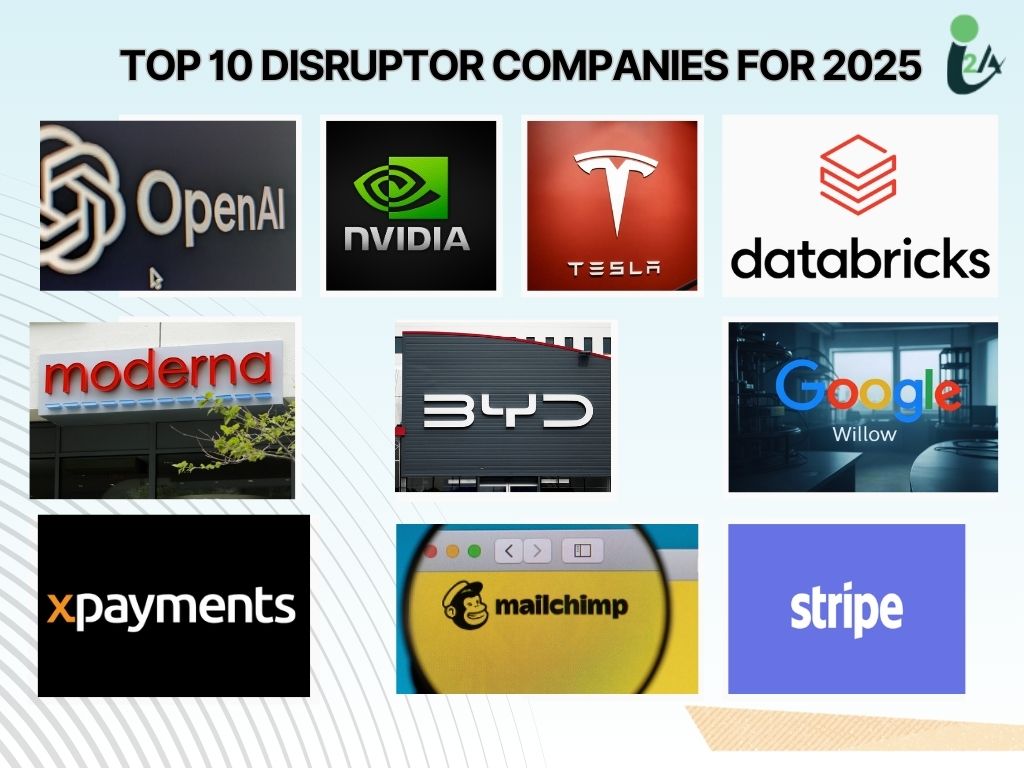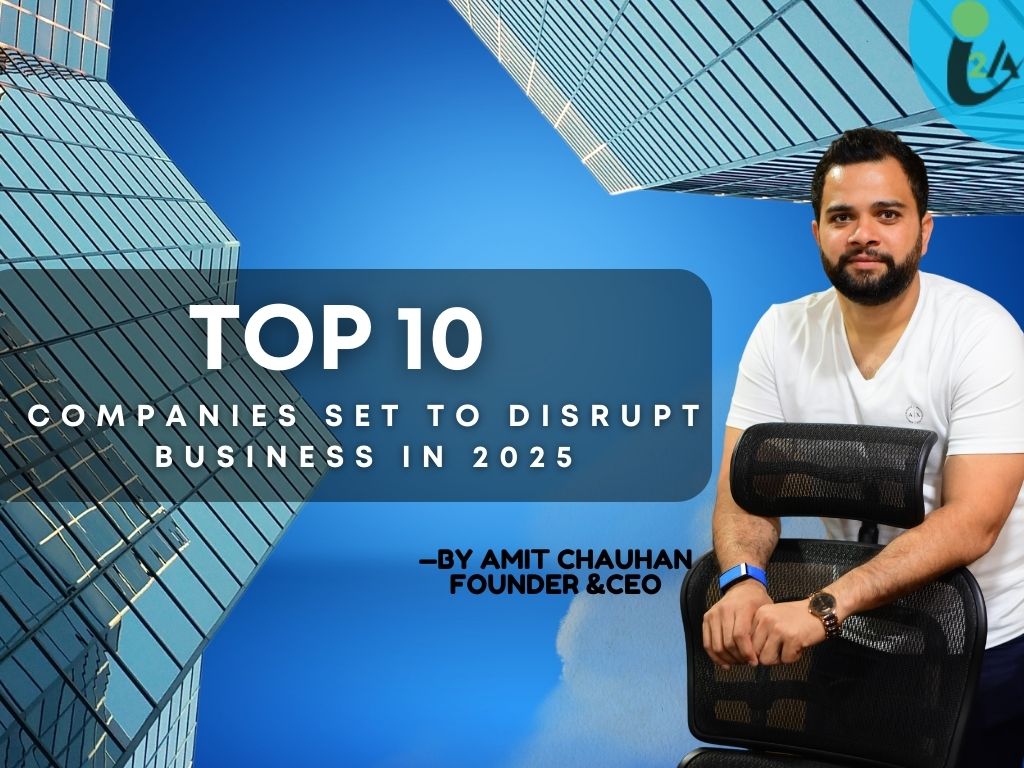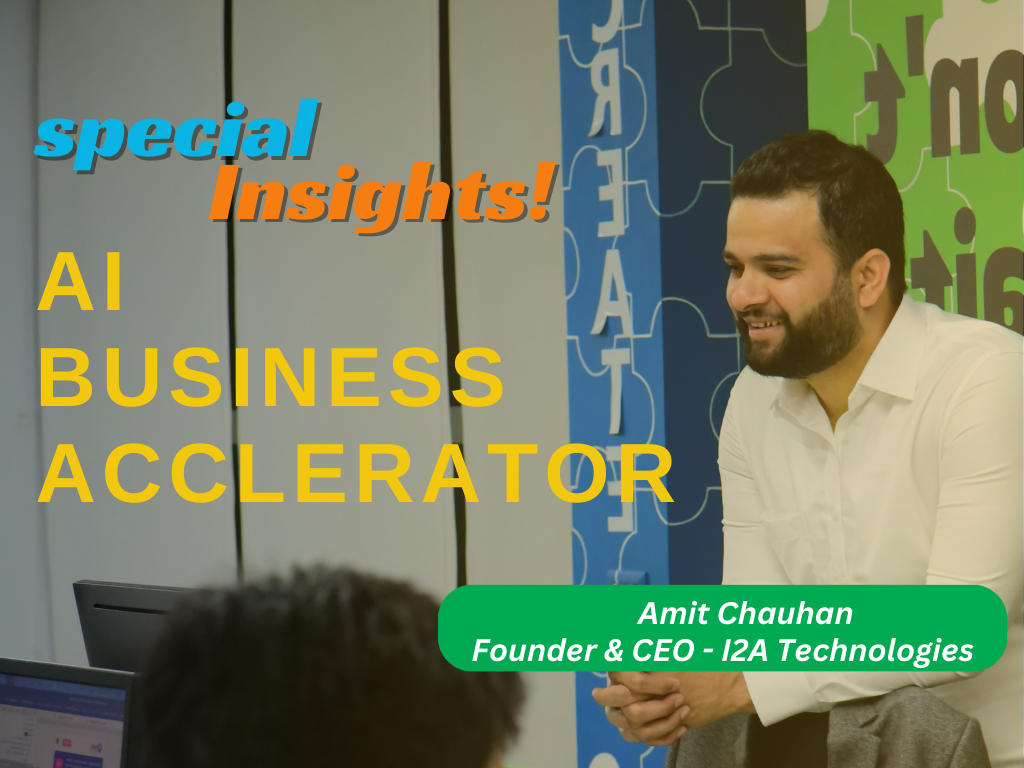Amit Chauhan, the Founder and CEO of I2A Technologies, identifies artificial intelligence, data analytics, electric vehicles, blockchain computing, quantum computing, and SaaS as the technologies reshaping the way businesses operate in 2025. These disruptive innovations are not only transforming industries but also paving the way for new business opportunities and models.
Disruptive technologies often give rise to business models that displace traditional systems. For example, Tesla’s autonomous vehicles have revolutionized transportation, while Stripe’s fintech solutions continue to simplify digital payments for businesses of all sizes. In e-commerce, AI assistants are now helping shoppers manage choices more effectively, with platforms integrating chatbots and virtual assistants for a seamless buying experience.
The rise of AI-based bots is another area disrupting industries. Social influencers like AI model Lil Miquela are reshaping advertising, while AI-generated news readers like Xinhua’s Xin Xiaomeng are making waves in journalism. Even in entertainment, AI-based music bands such as Japan’s Vocaloid Hatsune Miku are redefining how audiences consume music. These developments showcase the creative potential of artificial intelligence in delivering new products and experiences.
Interestingly, many disruptor companies start small, often bootstrapped or leveraging lean principles to achieve impactful outcomes. These startups focus on developing innovative solutions while minimizing costs and maximizing efficiency. Their ability to scale quickly while retaining a clear vision sets them apart in highly competitive markets.
Amit Chauhan, a staunch advocate of resourceful entrepreneurship, exemplifies this philosophy through his bootstrapping journey. By focusing on innovation and managing resources wisely, he has developed I2A Technologies into a disruptor in the digital marketing space. “Disruption begins with solving real problems and creating long-term value,” Amit shares, emphasizing that success comes from resourcefulness, vision, and unwavering commitment to outcomes.
Amit Chauhan 2025 Disruptor Companies List: Top 10 Disruptor Companies for 2025

OpenAI (Generative AI)
OpenAI has become a leader among disruptor companies by developing cutting-edge generative AI technologies like ChatGPT, DALL-E, and other tools that redefine how businesses and individuals interact with artificial intelligence. OpenAI’s ability to offer customizable AI solutions allows even non-technical users to create personalized GPTs. Its APIs seamlessly integrate with other platforms, enabling businesses to develop innovative solutions for search, customer service, and content creation. With upcoming advancements in video generation, OpenAI is poised to transform industries yet again.
This disruptive technology targets both B2B and B2C markets, offering immense potential across industries like digital marketing, education, and healthcare. For example, businesses can leverage AI-generated content to streamline their marketing efforts, while educational platforms are using AI to provide personalized learning experiences. Industries dependent on traditional search models, like SEO and Google Ads, face unprecedented challenges as OpenAI’s AI search capabilities emerge.
Examples of OpenAI’s disruption are already visible. ChatGPT has been adopted by businesses to develop automated customer service solutions, reducing operational costs. Marketers use DALL-E for custom visuals, cutting down reliance on expensive graphic designers. Its API integration is enabling startups to create innovative SaaS tools without large technical teams, proving OpenAI’s ability to reshape existing business models and empower smaller companies.
For Amit Chauhan, Founder and CEO of I2A Technologies, OpenAI exemplifies the power of disruptive innovation. “OpenAI isn’t just providing tools; it’s creating an ecosystem where businesses of any size can access world-class AI capabilities,” he explains. Chauhan envisions how such new technologies can help customers rethink traditional markets, much like how I2A Technologies uses AI based data analytics in digital marketing and building re-targetting campaings.
Nvidia (Physical AI and AI Chips)
Nvidia is spearheading the integration of physical AI and AI chip manufacturing, driving advancements in areas like autonomous vehicles, robotics, and edge computing. By focusing on creating GPUs and AI hardware capable of supporting massive workloads, Nvidia has revolutionized how businesses adopt AI in real-world applications. Its hardware serves as the backbone for AI models, enabling companies to deploy disruptive technologies at scale.
Nvidia’s solutions primarily target B2B markets, especially in industries like energy, manufacturing, healthcare, and transportation. Companies dependent on traditional computing models are under threat as Nvidia’s products allow businesses to harness the full power of AI and machine learning in real-time, automating processes and transforming operational efficiency.
One example of Nvidia’s impact is in the automotive sector, where its AI chips power self-driving technologies in vehicles like Tesla. In manufacturing, Nvidia’s hardware enables predictive maintenance by analyzing machine data in real-time. Its GPUs are also being used in healthcare to develop AI-assisted diagnostic tools, proving their ability to disrupt multiple markets.
Amit Chauhan draws parallels between Nvidia’s innovative role and the bootstrapping philosophy he champions. “Disruption isn’t about replacing technologies but rethinking how they are deployed,” he says. Nvidia’s focus on practical applications aligns with Chauhan’s emphasis on innovation that solves real-world problems and empowers businesses to grow sustainably.
Moderna (mRNA Innovation Beyond Vaccines)
Moderna, a disruptor in healthcare, has redefined the application of mRNA technology, moving beyond vaccines to target diseases like cancer and genetic disorders. This new technology allows the company to develop tailored therapies by programming cells to produce proteins that combat specific diseases. Its ability to scale mRNA solutions is reshaping medicine and creating unprecedented opportunities for customers in healthcare.
Moderna’s innovations are reshaping B2B markets, especially in pharmaceuticals, and B2C by offering hope for treating previously untreatable diseases. The business models of traditional drug manufacturers are being challenged by Moderna’s faster, more adaptable mRNA technology. Its work also extends into preventative care, potentially upending existing medical systems.
Examples include Moderna’s experimental cancer vaccine trials and its mRNA flu vaccines, both demonstrating how it disrupts drug development timelines. In markets like personalized medicine, Moderna is reducing costs and increasing accessibility for patients, further highlighting its ability to transform healthcare outcomes.
For Amit Chauhan, Moderna embodies the spirit of disruptive innovation. “Moderna shows how rethinking established practices can create groundbreaking results,” he notes. Chauhan sees parallels in his own work, where I2A Technologies challenges traditional travel bookings, digital marketing and marketing automation for small business owners. It’s this mindset of leveraging new technologies to create lasting value that both Moderna and Chauhan exemplify.
Stripe (Fintech Simplified)
Stripe has consistently led innovation in the payment services market, introducing transformative technologies that redefine how businesses transact. Its open banking-powered payment method, Pay by Bank, enables real-time, low-cost payments directly from customer bank accounts. Stripe Capital, another game-changing service, offers small businesses access to flexible financing based on their transaction history, further simplifying the path to growth.
Targeting B2B and B2C businesses, Stripe’s services challenge traditional payment systems and banking services, especially for startups and small enterprises that previously faced barriers to financial access. By removing intermediaries, Stripe’s solutions help businesses save costs and improve efficiency, particularly in sectors with high-value transactions like retail, e-commerce, and services.
Stripe’s disruption is evident in its Pay by Bank feature, now live in the U.K., which saves businesses tens of thousands in monthly payment fees. Stripe Capital proactively offers loans to merchants without lengthy approval processes. Additionally, its acquisition of Bridge, a stablecoin payment startup, demonstrates Stripe’s ambition to integrate blockchain technology, signaling a shift toward future-proof financial ideas.
Amit Chauhan lauds Stripe’s focus on supporting startups, drawing parallels to his bootstrapping philosophy. “Stripe’s ability to connect businesses with tools that promote financial independence aligns perfectly with the entrepreneurial mindset,” Amit shares. He emphasizes that thinking creatively about resources can unlock growth, whether in payments or building a sustainable business.
Databricks (Data Orchestration)
Databricks has redefined data analytics with its unified data lakehouse platform, empowering organizations to govern, manage, and utilize data for building enterprise-level AI applications. The company has disrupted traditional data warehouses and software giants like Oracle by offering a more open and collaborative approach to data innovation. Recently, Databricks has doubled down on AI development, helping companies across industries create advanced artificial intelligence solutions.
Databricks primarily targets B2B markets in industries ranging from healthcare and retail to supply chain logistics and professional sports. By offering businesses tools to efficiently handle data on a unified platform, Databricks disrupts legacy systems and facilitates real-time decision-making in data-rich environments.
Examples of Databricks’ impact include enabling Walgreens to optimize inventory management, helping Rivian develop EV logistics with AI, and empowering the NBA and Texas Rangers with data-driven insights for game strategies. With over 10,000 customers, including Condé Nast, Shell, and Toyota, Databricks consistently demonstrates its ability to push the boundaries of data organization.
Amit Chauhan identifies Databricks as a prime example of innovation through data-driven thinking. “In today’s world, the businesses that organize and leverage their data effectively are the ones that lead,” he explains. Amit sees parallels in his own work with I2A Technologies, where creating actionable marketing decisions empowers businesses to meet market demand and drive success.
X Payments (All Payment and All Integration App by Elon Musk)
Elon Musk’s X Payments is poised to disrupt the fintech world with its integration of payment systems into a social media platform. Positioned as part of Musk’s broader vision for X to become an “everything app,” X Payments would allow users to send money, trade securities, and manage their finances directly within the app. By leveraging blockchain technology, X Payments offers transparent and secure transactions, challenging both traditional banking systems and existing digital wallets.
Targeting B2C users, X Payments aims to attract mainstream customers and crypto enthusiasts alike. Its ability to integrate financial services seamlessly into the user experience positions it as a competitor to banks, wallets like PayPal, and even established fintech startups. This convergence of communication and commerce introduces a new business model that disrupts both industries.
Examples of its disruptive potential include X’s acquisition of money transmitter licenses in 38 states, its ambitions to eliminate traditional bank accounts, and the integration of cryptocurrency for financial transactions. Musk’s push for a WeChat-like ecosystem in the West has already raised expectations of how platforms can merge ideas of finance, social networking, and commerce.
Amit Chauhan praises Musk’s ambition for reinventing financial access and services. “Disruption thrives when you expect the unexpected,” Amit remarks. He sees X Payments’ integrated approach as a reflection of how new ideas can challenge outdated systems, much like his bootstrapping philosophy challenges traditional funding norms.
Mailchimp (Bootstrapped Email Marketing Innovator)
Mailchimp, founded in 2001 by Ben Chestnut and Dan Kurzius, began as a side project and evolved into a leading email marketing platform. Remarkably, it achieved this growth without external funding, relying solely on its own resources.
Mailchimp primarily targets small to medium-sized businesses (SMBs), providing them with user-friendly tools to execute effective email marketing campaigns. Its accessible platform has disrupted traditional marketing channels, enabling SMBs to compete with larger corporations without the need for substantial marketing budgets.
The company’s freemium model allowed users to start for free and scale as their needs grew, fostering a vast user base. By 2021, Mailchimp had over 14 million paying users across more than 175 countries. Its commitment to customer-centric features and continuous innovation made it a preferred choice for businesses worldwide.
Amit Chauhan, Founder and CEO of I2A Technologies, emphasizes that Mailchimp’s journey exemplifies how self-funded businesses can drive significant industry change without relying on external capital. He notes that such success stories inspire entrepreneurs to leverage their own resources and creativity to achieve remarkable outcomes.
Tesla (Driverless and Electric Cars)
Tesla, under the leadership of Elon Musk, has been at the forefront of electric vehicle (EV) innovation and autonomous driving technology. The company has developed advanced driver-assistance systems and is actively working towards fully autonomous vehicles, aiming to revolutionize personal and public transportation.
Tesla’s innovations target both individual consumers and businesses, challenging traditional automotive manufacturers and energy companies. By promoting sustainable energy solutions and integrating cutting-edge technology, Tesla disrupts conventional automotive production and the fossil fuel industry.
The introduction of models like the affordable “Model Q,” priced under $30,000, and the unveiling of the “Cybercab” robotaxi demonstrate Tesla’s commitment to making EVs and autonomous transportation accessible to a broader audience. These developments have prompted traditional automakers to accelerate their own EV and autonomous vehicle programs.
Amit Chauhan observes that Tesla’s relentless pursuit of innovation and its ability to challenge industry norms serve as a blueprint for disruptor companies. He believes that embracing new technologies and business models is essential for driving progress and staying competitive in today’s rapidly evolving markets.
BYD (Electric Vehicles for the Masses)
BYD, a Chinese automaker, is leading the charge in disruptive innovation by making electric vehicles (EVs) affordable for the masses. With an emphasis on cutting-edge battery technology and feature-loaded EVs, BYD has become a global leader in the EV sector, outpacing many traditional car manufacturers. Its ability to scale production efficiently while maintaining cost-effectiveness has positioned BYD as a dominant force in the automotive industry.
The rise of BYD and other Chinese EV makers has created significant challenges for traditional automakers like Volkswagen and Nissan. The German car industry, which once dominated global markets, is now grappling with rising production costs and slow adaptation to EV demand. Volkswagen has faced declining sales and is scaling back operations, while Nissan is struggling to remain competitive in a market shifting toward EVs. Furthermore, countries like India are imposing tariff walls against Chinese imports to protect their domestic markets, creating additional hurdles for companies like BYD to expand globally.
Despite these barriers, BYD’s prowess in battery innovation and its ability to manufacture feature-rich cars at a competitive price continue to disrupt the global EV sector. For instance, BYD’s “Blade Battery” technology offers higher safety, longer life, and reduced cost, enabling its EVs to be more affordable than their competitors. Additionally, BYD’s models like the Atto 3 and Dolphin are gaining traction in emerging markets, where affordability and advanced features are critical for adoption.
Amit Chauhan, Founder and CEO of I2A Technologies, sees BYD as an example of how focusing on innovation and scalability can transform industries. “BYD’s ability to reshape markets with cost-efficient, high-performance solutions underscores the importance of adaptability and foresight,” Chauhan remarks. He believes BYD’s success reflects the power of leveraging resources and technology to deliver customer-focused solutions at scale, a principle he has championed throughout his entrepreneurial journey.
Willow by Google (Quantum Computing)
Google’s latest quantum computing chip, Willow, represents a significant leap in computational capabilities. Developed by Google’s Quantum AI team, Willow can perform complex calculations in mere minutes—tasks that would take classical supercomputers an unfathomable 10 septillion years.
This advancement positions Willow at the forefront of disruptive technologies, poised to revolutionize various industries.
The implications of Willow’s capabilities are vast, particularly in accelerating the next phase of artificial intelligence development. Quantum computing’s ability to process and analyze massive datasets at unprecedented speeds will enable AI systems to learn, adapt, and make decisions more efficiently than ever before. This quantum leap is expected to usher in AI applications that are more powerful and versatile, surpassing current technological limitations.
Beyond AI, Willow’s computational prowess holds promise for solving complex problems in drug discovery, clean energy solutions, and material science. For instance, it could simulate molecular interactions at a quantum level, leading to breakthroughs in developing new medications or sustainable energy sources. Additionally, Google’s investment in small modular reactors to power its AI data centers underscores the symbiotic relationship between advanced computing and sustainable energy initiatives.
Amit Chauhan, Founder and CEO of I2A Technologies, views Willow’s emergence as a pivotal moment in technological innovation. He notes, “The advent of quantum computing, exemplified by Google’s Willow chip, is set to redefine the boundaries of what’s possible in AI and beyond. This progression underscores the importance of embracing disruptive innovation to stay ahead in the evolving technological landscape.”
Amit Chauhan on Handling Disruption
Disruption is not a threat; it’s an opportunity to rewrite the rules,” says Amit Chauhan, Founder and CEO of I2A Technologies. He emphasizes that businesses must embrace disruptive innovation by fostering adaptability, creativity, and resourcefulness. Whether it’s leveraging new technologies like quantum computing, harnessing AI for growth, or building lean, bootstrapped models, the key lies in being proactive and future-focused.
Amit advises businesses to recognize market shifts early, understand their customers’ evolving needs, and be willing to fail forward—learning from setbacks to fuel growth. “Disruptors are not afraid to think big but start small,” he notes, underscoring the importance of sustainable development.
In a world where industries are rapidly evolving, Amit encourages entrepreneurs to focus on solutions that deliver long-term value, ensuring they not only survive but thrive in the face of transformation. “Adapt, innovate, and lead—because disruption waits for no one.


 Publisher
Publisher 


